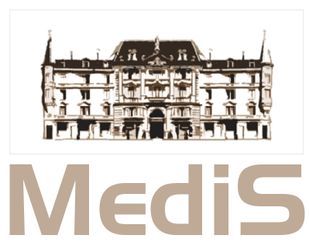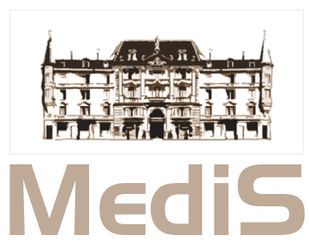Vein Center Schauspielhaus
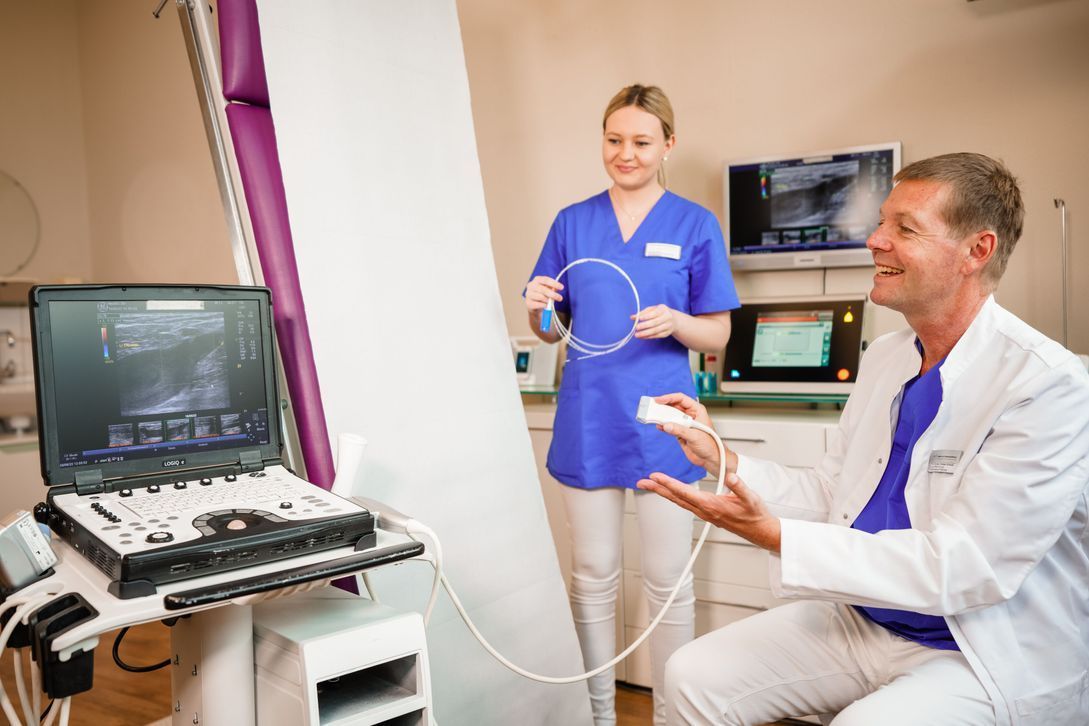
PD Dr. med. Sabine Schmidt-Weitmann and PD Dr. Dr. med. Christian Schmidt warmly welcome you to the “Vein Centre Schauspielhaus” as experienced vein specialists.
We offer the diagnosis and treatment of:
- Swelling and painful legs
- Varicose veins (varices, varicose veins)
- Spider veins
- Inflammation of veins (phlebitis)
- Thrombosis (occlusion of deep or superficial veins)
- Leg wounds (ulcus cruris)
- Pelvic vein congestion syndrome (varicose veins in the lower abdomen and genital area)
Our treatment of venous disorders (phlebology) is based on an individual, holistic concept. The diagnostic workup, therapy and aftercare are tailored to your personal needs. Each of the procedures mentioned below has got its specific advantages and disadvantages, and each patient has her/his own expectations. Our extensive experience with all procedures enables us to offer you the best possible therapy on a very personal level. We focus on the endovenous therapy of varicose veins using laser and radiofrequency procedures, which are carried out on an outpatient basis in our vein center using local anesthetics ensuring only minimal discomfort.
As a surgeon, vascular surgeon and vein specialist (phlebology), PD Dr. Dr. med. Christian Schmidt is a well-known expert in the field of vein diagnostics and therapy. In 2006 he was one of the first to carry out the modern endoluminal therapy of varicose veins by laser at the University Hospital Zurich. Most recently, he worked as senior vascular surgeon at the Bellevue vein clinic in Kreuzlingen until 2015, co-director of the vein centre at the University Hospital Zurich until 2017 and at the vein centre in Feldmeilen until 2020. He has been working in the MediS Zurich “Vein centre Schauspielhaus” since January 2018, where he performs all minimally invasive therapies. Since 2020 he has been head of the “Vein Centre Schauspielhaus”. He is an academic lecturer at the University of Zurich for vascular surgery.
PD Dr. med. Sabine Schmidt- Weitmann is a specialist in General Internal Medicine focusing on modern varicose vein diagnostics and treatment. She is accredited by the Swiss Society of Ultrasound in Medicine (SGUM) and has a vast experience in minimal invasive endovenous procedures such as endoluminal laser and radiofrequency ablation and foam sclerotherapy. Since 2020, she is co-head of the “Vein centre Schauspielhaus”. She has an extensive academic track record resulting in numerous publications. Since 2008, she is academic lecturer at the University of Zurich for Telemedicine and eHealth and was awarded the Venia Legendi
Legendi (Habilitation) in the field of "Clinical Telemedicine.
TREATMENTS
Spider Veins
- Microsclerotherapy
Varicose veins
- Ultrasound-guided foam sclerotherapy
- Minimal-invasive endovenous therapies (Laser, ClosureFast® Radiofrequency, Glue)
- Mini- phlebectomy
- Conventional open surgery (crossectomy and stripping)
- Compression therapy (compression stockings, intermittent pneumatic compression IPC)
- Wound management
MICROSCLEROTHERAPY
Spider veins or leg thread veins are tiny veins (less than 1mm in diameter) just below the skin surface. They are usually only a cosmetic problem, however, spider veins can cause symptoms like itching and burning. In 10-20% of all patients with extensive spider veins, additional varicose veins are present and might not be visible from outside. Therefore, all patients with spider veins should undergo a thorough diagnostic workup including an ultrasound examination of the superficial and deep veinous system to rule out this condition. In case varicose veins are present, they should be treated before microsclerotherapy of spider veins to ensure a long lasting, best cosmetic result.
Spider veins are best treated according to international guidelines by microsclerotherapy. We offer 30 minute sessions of almost pain-free injection of liquid sclerosants such as Aethoxysclerol® or Chromalaun. After in initial 1-2 days of slight inflammation which is necessary for the spider veins to close up, it takes another 4-8 weeks depending on size to disappear. Depending on the amount of spider veins, a second session might be necessary. As usual for cosmetic therapies, spider vein microsclerotherapy is not covered by the basic medical insurance.
ULTRASOUND – GUIDED FOAM SCLEROTHERAPY (UGFS)
Foam sclerotherapy is usually used for limited and recurrent varicose veins and special conditions like feeding veins of a venous ulcer. This completely pain-free procedure is carried out on an outpatient basis and takes about 30 minutes. A small needle (butterfly) is inserted in the target vein and an alcohol foam is injected under ultrasound guidance. This ensures that only the varicose veins are treated. The alcohol foam causes a slight inflammatory reaction of the varicose vein for 1-2 weeks, which results in an occlusion. Depending on size, the varicose vein is dissolved by the body after 4-8 weeks.
Wearing a compression stocking is recommended for 1 week.
MINIMAL INVASIVE, ENDOVENOUS THERAPIES
Endovenous laser ablation (EVLA) and endovenous radiofrequency ablation (RFA) are the gold standard treatment for varicose veins as recommended by European, U.S. and U.K. guidelines. Conventional open surgery or compression therapy by compression stockings alone are only recommended as second choice when endovenous therapies are impossible to perform. Therefore, conventional open surgery has almost been replaced completely by endovenous therapies such as EVLA and RFA in modern vein treatment as offered at the “Vein Centre Schauspielhaus”.
Endovenous laser ablation (EVLA) and radiofrequency Ablation (RFA) EVLA and RFA are minimal invasive endoluminal procedures carried out on an outpatient basis under local anesthesia. The procedure takes about 1-2 hours and patients can usually continue their daily activities on the same day or the day after. Since 2016, costs are covered by the swiss basic health insurance.
Under ultrasound guidance, the very thin EVLA (1.3mm) or RFA catheter is inserted in the varicose vein. After delivery of local (tumescence) anesthesia and making sure, that the patient is completely pain-free, heat is applied at the catheter tip which is slowly pulled along the entire length of the vein causing vein wall destruction and vessel occlusion. At the end of the procedure, there is no blood flow in the varicose vein anymore, which is diverted into deeper healthy veins.
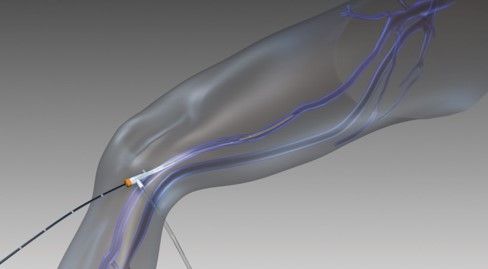
Video of ClosureFast® procedure
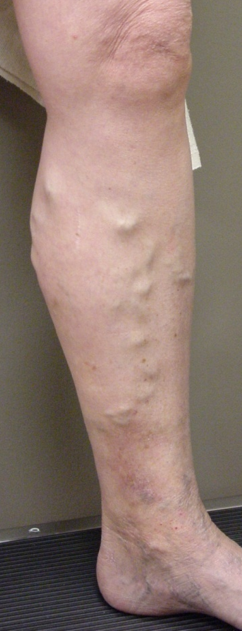
Before the OP
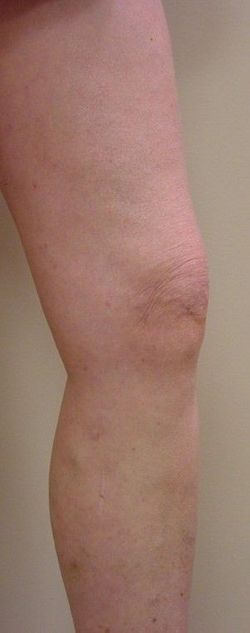
Video ClosureFast® procedure
The latest development in endoluminal therapies is the occlusion of the varicose vein by glue, such as VenaSeal®. Cyanoacrylate glue is inserted via a catheter into the varicose vein without the application of heat and the need for tumescent anesthesia. Basic health insurance, however, does not cover the costs currently.
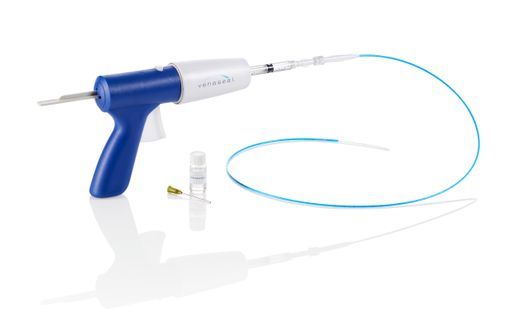
Video of VenaSeal® procedure
Images and videos courtesy of Medtronic
What are the advantages of minimal invasive, endovenous therapies?
- Outpatient procedure of only 1-2 hours duration, no hospital stay required
- No general or regional anesthesia, minimal discomfort
- Small incisions, no scars, no loss of blood
- Back to normal activities within 1-2 days
- Compression stockings for only 1 week after the procedure
In conclusion, endovenous laser and radiofrequency ablation have been performed for more than 20 years and numerous studies have shown excellent safety and effectiveness and reduced postoperative pain and complications. Therefore, they are also the treatment of choice at the “Vein Centre Schauspielhaus”.
MINI-PHLEBECTOMY
This describes a minimal invasive removal of varicose vein side branches through 1-2 mm incisions that do not require stiches. Incisions are closed up by steristrips, which ca be removed after 7 days. The procedure is usually performed together with endovenous laser- or radiofrequency therapy under local anesthesia on an outpatient basis.
CONVENTIONAL OPEN SURGERY (CROSSECTOMY AND STRIPPING)
Conventional open surgery has been performed for more than 100 years and has been shown to effectively treat varicose veins, alleviate symptoms, prevent chronic venous insufficiency and reduce recurrence rates of venous ulcers. However, with the advent of modern minimal invasive procedures, conventional open surgery is recommended today only in certain, rare cases such as patients preference and very large recurrent varicose veins.
PD Dr. Dr. Christian Schmidt as vascular surgeon provides this service if needed to his in-patients at the “Klinik Hirslanden Zurich” irrespective of different insurance models.
Opening hours:
- Mon - Fri
- - -
- Sat - Sun
- Closed
Phone consultation:
- Mon - Fri
- - -
- Sat - Sun
- Closed
Appointments will be made according to agreement.


